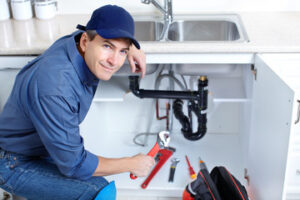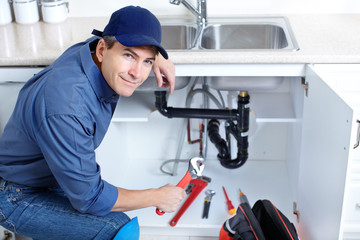To become a plumber, you need to have relevant work experience and complete a program at a technical school or college. You can also take an apprenticeship with a construction firm to gain on-the-job training. For professional help, contact Plumbers Spring TX now!
Every house and building requires a well-functioning plumbing system that removes waste, supplies clean water, and regulates indoor climate. Plumbers are skilled professionals who maintain and repair these systems.

One of the biggest mistakes DIYers make when performing plumbing projects is using the wrong tools. For example, using a pair of regular pliers instead of a set of internal pipe wrenches can lead to damaged pipes and fittings that may need to be replaced. This mistake can also be dangerous as it could result in serious injuries.
Moreover, using the wrong materials is another common mistake DIYers make when working on their plumbing projects. For instance, using PVC glue instead of proper pipe adhesive can cause leaks and other problems that will cost you money in the long run. Similarly, using shears or cutters where a hacksaw should be used can also be problematic.
As a general rule, keeping an emergency kit of the necessary tools and replacement parts in your home is a good idea so you can take care of plumbing emergencies as they arise. However, you should always be aware of your limits and call a professional if a job seems too big for you to handle.
Local plumbing codes are in place to ensure that your home’s water systems work properly and safely. They govern everything from how pipes are installed to what materials are allowed. Generally, it’s illegal to work on your home’s plumbing system without complying with these laws. Failure to do so may result in fines or even legal action. But more importantly, it can also compromise the safety and integrity of your home’s plumbing system.
The purpose of local plumbing codes is to guarantee the safe and correct operation of your home’s water systems. They regulate everything, including the installation of pipes and the materials that are permitted. In general, breaking these laws makes it unlawful to work on your home’s plumbing system in any way. Failing to comply with this could lead to fines or even legal action. More significantly, though, it may jeopardize the integrity and safety of the plumbing system in your house.
One of the most common plumbing code violations is using non-code-approved materials. For instance, if you’re replacing a faucet, it’s important to use copper or PVC fittings rather than rubber ones. Rubber ones don’t hold up well to the temperature changes in plumbing systems and may leak or break easily. Similarly, using the wrong size pipe for your new fixtures can cause them to leak or burst, leading to costly repairs.
Another reason to pay attention to plumbing codes is that many DIY projects require permits. If you’re unsure whether or not your project requires a permit, it’s best to consult a professional plumber. This will help you avoid committing serious errors that could lead to fines or structural damage to your home.
Lastly, plumbing codes often address public health concerns. For example, if you’re working on a plumbing system connected to your neighborhood water supply, local plumbing codes will likely prohibit you from connecting your waste pipes to these lines. This prevents cross-contamination and keeps your water safe for everyone in your community.
Consider hiring a licensed plumber if you plan on doing a large-scale plumbing renovation. They’ll know what building and plumbing codes to follow, which will help protect you from future plumbing problems and keep your home up to code when it comes time to sell.
You can do some tasks yourself, like replacing a faucet washer or unclogging a drain. However, leave it to the professionals if you’re doing anything major, such as re-piping your entire house or installing a water heater. This will save you money in the long run and ensure that your plumbing system is up to code and meets all applicable safety standards.
Homeowners often perform DIY plumbing projects to save money or make minor repairs. However, these DIY projects can lead to bigger problems if incorrectly done. This can include water damage, costly repairs, and safety hazards. In this video, Dean’s Home Services shows some of the most common DIY plumbing mistakes beginners make.
One of the biggest mistakes is using the wrong materials when working on a plumbing project. For example, using PVC glue instead of the proper pipe adhesive can cause leaks and other problems that will cost you more in the long run. Additionally, using pipes that are the incorrect size can also lead to issues.
Another mistake is over-tightening pipe fittings. This can strip the threads and break the rubber or plastic seal in the pipe connectors. Using Teflon tape or pipe dope on threaded connections can help prevent this problem.
Finally, forgetting to turn off the main water supply is a big mistake that can lead to serious water damage. Always locate and turn off the main water valve before beginning any plumbing project.
Plumbing is a complex task that involves a wide range of skills. Although it is tempting to do DIY plumbing projects, relying on YouTube tutorials may lead to mistakes that can cost you money and cause damage to your home. This is why using these guides with caution and critical thinking is crucial. Always verify the credibility of the content creators and cross-reference information to ensure accuracy.
Many homeowners are turning to YouTube to get help with their plumbing issues. The platform offers a variety of advantages, including visual guidance, a wide range of topics, and diverse content creators. YouTube also fosters a community where users can interact with each other and learn from each other’s experiences. This provides a sense of support that can empower individuals to tackle difficult plumbing tasks that were once considered exclusive to professionals.
Another advantage of YouTube is that it offers a variety of videos that can cover any topic. When searching for a particular task, you can find multiple tutorials that provide detailed step-by-step instructions. This allows you to compare different approaches and techniques and choose the best suits your needs. Attention to the comments and questions sections is important, as these can provide valuable insights and troubleshooting tips.
Finally, watching video tutorials on a mobile device provides flexibility and convenience. This can be beneficial when dealing with emergencies or with limited time. Moreover, the flexibility offered by these tutorials can help you avoid costly plumber services.
It is also important to remember that not all YouTube tutorials are created equal. Some videos contain inaccurate or misleading information, leading to costly mistakes and injuries. Therefore, it is essential to take the time to thoroughly research any plumbing project before attempting it on your own. This includes checking out a few tutorials and practicing the technique before tackling a major plumbing issue.
YouTube is an excellent resource for DIY plumbing. However, it is vital to remember that a professional plumber can handle complex plumbing problems that online resources cannot address. Always consider your level of skill and expertise, the specific requirements of the job, and local regulations when making decisions about DIY plumbing.
